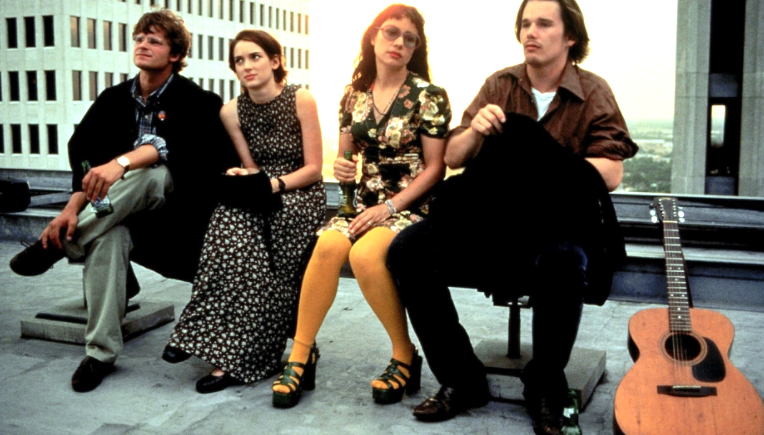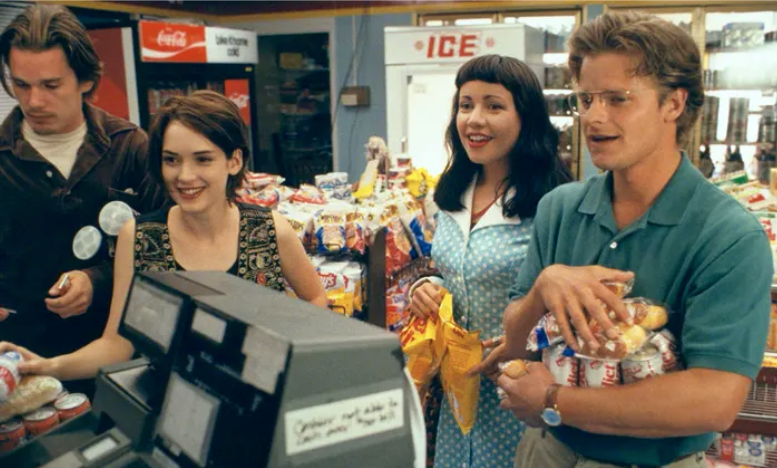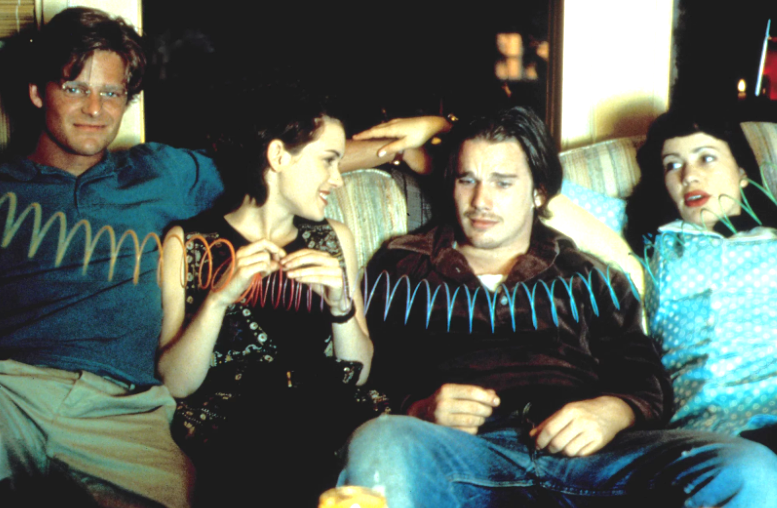In this series by Christopher James we investigate the 'Gay Best Friend' trope in movies.
 We're introduced to Sammy along with the whole crew of main characters on the roof after their college graduation, two minutes into the movie.
We're introduced to Sammy along with the whole crew of main characters on the roof after their college graduation, two minutes into the movie.
At last, it has come to this point. This marks the first week where I’ve covered a “first watch” for the Gay Best Friend series. Thanks go out to Julian who suggested Steve Zahn’s clean cut Sammy in Reality Bites, a 1994 Gen-X classic. As a proud, card-carrying millennial, Reality Bites had been a movie I had always meant to watch, but never gotten around to. The Winona Ryder fan in me was excited to use this column as an excuse to rectify this blind spot. Overall, the film left me a bit wanting. The characters and situations were a great encapsulation of the confusion you experiences the first years after college. It’s easy to see the lineage from this film to movies and TV shows I love and relate to (namely Girls on HBO and Frances Ha). However, the plot always felt less developed than the characters and performances. The movie exists now as a museum piece encapsulating post-grad life in the 90s. That’s not meant to be a dig. Plenty of movies from the '00s and '10s will feel the same way in 10-20 years. In fact, it speaks to why this modest love triangle from 1994 has endured for twenty-six years in the cultural conversation...
Lelaina Pierce: Hey, Sammy, what's your goal?
Sammy Gray: My goal is... I'd like a career or something.
Vickie Miner: Here’s the deal. I’m gonna take Sam against his will and straighten him out, because I believe if we can get two women on the Supreme Court, we can get at least one on you, Sam.
Steve Zahn’s Sammy feels like the 1.0 version of the “gay best friend.” When we first meet him, he exhibits the same aimless spirit as the rest of his Gen-X friends. He’s not quite as against the idea of work as his anti-capitalist best friend Troy Dyer (Ethan Hawke), but not as motivated as aspiring director/documentarian Lelaina Pierce (Winona Ryder).
Sammy is closer in spirit and closest to Vickie Miner (Janeane Garofalo), everyone’s snarky best friend who finds herself moving up to a management position at the Gap, excelling at her backup job. Sammy is defined first by his sexuality in this early scene, but via Vickie, not himself. It’s established that he is celibate for the time being, and afraid to come out to his parents.
 Let's be honest, we all wish we were dancing with this group of friends in the middle of a gas station store
Let's be honest, we all wish we were dancing with this group of friends in the middle of a gas station store
Perhaps this is why Sammy never becomes more of a full fledged character in Reality Bites. Every other member of the friend group gets their own storyline and engages in conflict. Lelaina and Troy are two of the three pieces of the central romantic triangle, with Ben Stiller’s TV executive Michael Grates standing by as the “more adult and successful” option for Lelaina. Garofalo is the standout at Vickie, who seems horrified at how well she adapts to the square working world. Her friendship with the more idealistic and privileged Lelaina also creates some great conflict later in the film. Sammy, however, recedes. Of the quarter of friends, he is always number four. He’s down for a good time. He’ll dance in a gas station with you to “My Sharona” and share a bowl or two. However, other than initial descriptive character beats, Sammy is more set dressing than full character.
Still, there's some truth to the characterization.
By having to repress his sexual urges and keep his sexuality hidden from his family, Sammy is experienced at fading into the background. He’s a nice, comforting guy who is always around to help out. He's not the conflict-ready type, which makes it harder to build sections of the movie around him. In this respect, Sammy captures well the timidity and fear some queer people experience when they first begin to inch toward living their truth, unsure of how the world around them will react. (It would be great if the film could’ve dramatized this a bit more.)
 Was signing up to have his friend film his coming out the best idea Sammy came up with?
Was signing up to have his friend film his coming out the best idea Sammy came up with?
Sammy Gray: Well... I came out to her, and… she's still a little bit upset. But you know… You know, I think the real reason… that I've been celibate for so long… isn't really because I'm that terrified of the big "A"... but because I can't really start my life… without being honest about who I am and… I want to be in there, too. I want to feel miserable and happy and all of that. I mean, I... I want to… I want to be let back in the house.
The only time Sammy really stands on his own as a character is during a short aside scene where Lelaina films him after he comes out to his Mom. We only see one shot of her silhouette from the outside looking in. Her pacing conveys a lot of emotions - worry, fear, sadness, maybe even a little anger. The tone of Sammy’s recounting of the conversation speaks louder than his actual words. In just the prior scene, he had seemed so confident when practicing the conversation with Vickie acting as his Mom. He thought he would break the news and be able to get his Mom to join PFLAG (wouldn’t we all be so thrilled). Now, Sammy’s quivering voice conceals hurt. Even as he tries to shrug off sadness or focus on the bright life he has in front of him, he just wants to make sure he can be let back into the house. The world in front of him looks so much brighter, but he still wants to retain some vestiges of the old him that his mother loved.
Many of the performances in this series have involved straight actors playing gay characters. In our current day and age, we have enough prominent gay actors that are marketable and talented that it feels somewhat grievous to cast a straight actor in a gay role, unless they bring something new to the table. Looking back, especially at movies and TV shows from the 90s, there was so much less representation. Steve Zahn, who identifies as straight, was taking a risk playing an out gay character so early in his career. But he does a very good job at side-stepping broad cliches. In his hands, Sammy comes off as a sweet young kid who is only just starting to peak out of his shell.
 An accurate depiction of what it looks like to be "the other friends in the group" when two of them start dating
An accurate depiction of what it looks like to be "the other friends in the group" when two of them start dating
Here’s another why the movie is valuable as a cultural artifact. Sammy’s coming out story feels extremely representative of the experiences of young queer people in the 90s. Throughout the movie, AIDS is something that is on all the characters’ minds, not just Sammy. In fact, Vickie is the one who goes through an HIV scare after one of her sexual partners tests positive. Later in the film, her test comes back negative. Yet, this scare illustrates how the fear of the virus was ever-present for those entering adulthood and exploring their sexuality at the time. This also gets at why Sammy’s relationship with his own queerness feels tinged with repression and fear. His celibacy doesn’t just keep him safe from contracting AIDS, it keeps him safe from all the pressures, prejudices and scorn that comes with being gay in 1994.
Lelaina Pierce: I was really going to be somebody by the time I was 23.
Troy Dyer: Honey, all you have to be by the time you're 23 is yourself.
Lelaina Pierce: I don't know who that is anymore.
Troy Dyer: I do. And we all love her. I love her. She breaks my heart again and again, but I love her.
In the end, Lelaina chooses her brooding beau Troy over the yuppie Michael. The above exchange is meant to comfort Lelaina, who worries why she isn’t as successful as she had hoped to be. However, it could apply just as easily to any of the other characters in the friend group, including Sammy. When we first met him, he is still coming to terms with his sexuality and how that will factor into his life. By the end of the movie, he has comee out to his Mom and reckoned with his self-imposed celibacy. Many queer people go through a delayed or second adolescence, as they find themselves learning what it means to be who they are openly. Hopefully the rest of Sammy's 1990s will be filled with parties, love, joy, heartbreak, conflict and the full range of experiences every messy twentysomething experiences.